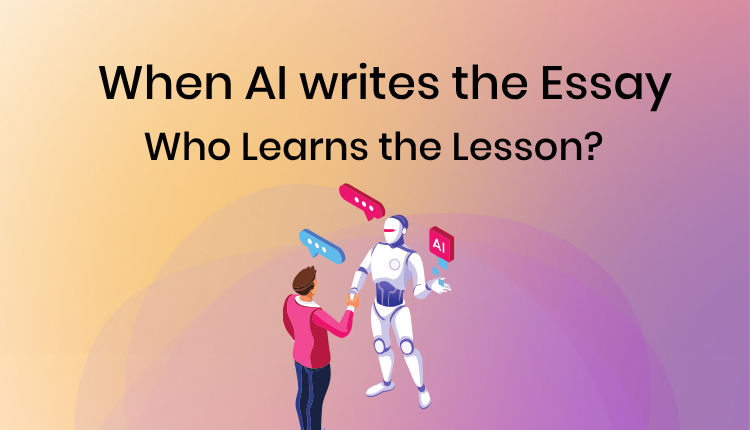When AI Writes the Essay, Who Learns the Lesson?

Generative AI tools like ChatGPT are reshaping how students tackle academic writing.
With a few simple prompts, students can now produce complete essays in just minutes. While this offers convenience, it raises an important question for educators: If artificial intelligence is handling the writing, what are students actually learning? Consider this when students rely heavily on AI, are they missing out on the fundamental skills that education is designed to cultivate?
A study conducted by a Chinese university revealed that many students use AI mainly to save time and avoid effort. However, this shortcut may come at a cost, as it potentially bypasses crucial cognitive and critical thinking processes. Over time, this could weaken the foundation of deep and meaningful learning.
Additionally, Harvard’s Inspiring Minds emphasizes that while AI may support structural elements, it cannot replace the intellectual struggle that leads to real understanding. In higher education, that struggle is essential. Allowing AI to write on behalf of students deprives them of valuable opportunities to practice skills central to analytical thinking.
Why Critical Thinking Is Still Essential
Critical thinking remains a cornerstone of higher education. It empowers students to:
-
Assess the reliability of sources and arguments
-
Detect bias and logical errors
-
Form conclusions based on evidence
-
Reflect on their own viewpoints and assumptions
When students use AI to bypass these steps, they may achieve good grades—but often without gaining a deep understanding of the material.
The Challenges for Educators
If you’re teaching today, you’ve likely noticed this shift. While AI content detectors were initially seen as a solution, they come with serious limitations:
-
They frequently misidentify human-written work as AI-generated
-
Minor text changes can deceive the detectors
-
They provide no proof—only a probability or suspicion
-
They don’t clarify how or when AI was used during writing
-
Overreliance on such tools can harm trust between students and faculty
-
They offer no constructive guidance to help students improve their writing or responsibly use AI
So how can educators ensure student work reflects authentic learning rather than just clever use of prompts?
Promoting Transparency and Accountability
Enter tools like Trinka DocuMark by Enago. Unlike traditional AI detectors, DocuMark is built to promote clarity and accountability. Powered by Trinka AI, this tool doesn’t just identify AI-generated content—it allows students to review, verify, and reflect on AI-assisted sections of their writing before submitting.
This process ensures that both faculty and students have a transparent, fact-based understanding of how a piece of writing was developed.
Why Educators Appreciate DocuMark
-
Provides context: Gives insight into how the document was created, not just the end result
-
Supports fair grading: Enables confident assessment backed by evidence
-
Reduces disputes: Helps avoid conflicts about originality and builds trust
-
Maintains academic standards: Upholds integrity without increasing administrative burdens
-
Encourages critical thinking: Identifies sections written, pasted, or generated by AI to evaluate student effort
Why Students Benefit
-
Promotes responsibility: Encourages students to reflect on their writing process and AI usage
-
Avoids unfair accusations: Less risk of false positives from flawed AI detectors
-
Supports ethical learning: Reinforces best practices for responsible use of AI
-
Improves writing: Keeps students connected to their ideas rather than fully outsourcing them
-
Boosts critical thinking: Keeps students actively engaged in the thought and writing process
Who Truly Learns?
With DocuMark, the student—not the AI—gains the knowledge.
Sure, AI can generate an essay. But it can’t think, reflect, or grow. When writing becomes merely a shortcut, the educational experience suffers. At its heart, education is about nurturing critical thinking, argument development, and original thought.
AI tools like DocuMark offer a forward-thinking solution—integrating technology with true learning. Rather than just detecting AI content, they provide a complete view of the writing journey, ensuring students remain active participants in their education.
Want to see how it works?
Book a demo of Trinka DocuMark and discover how you can protect academic integrity while embracing innovation.




